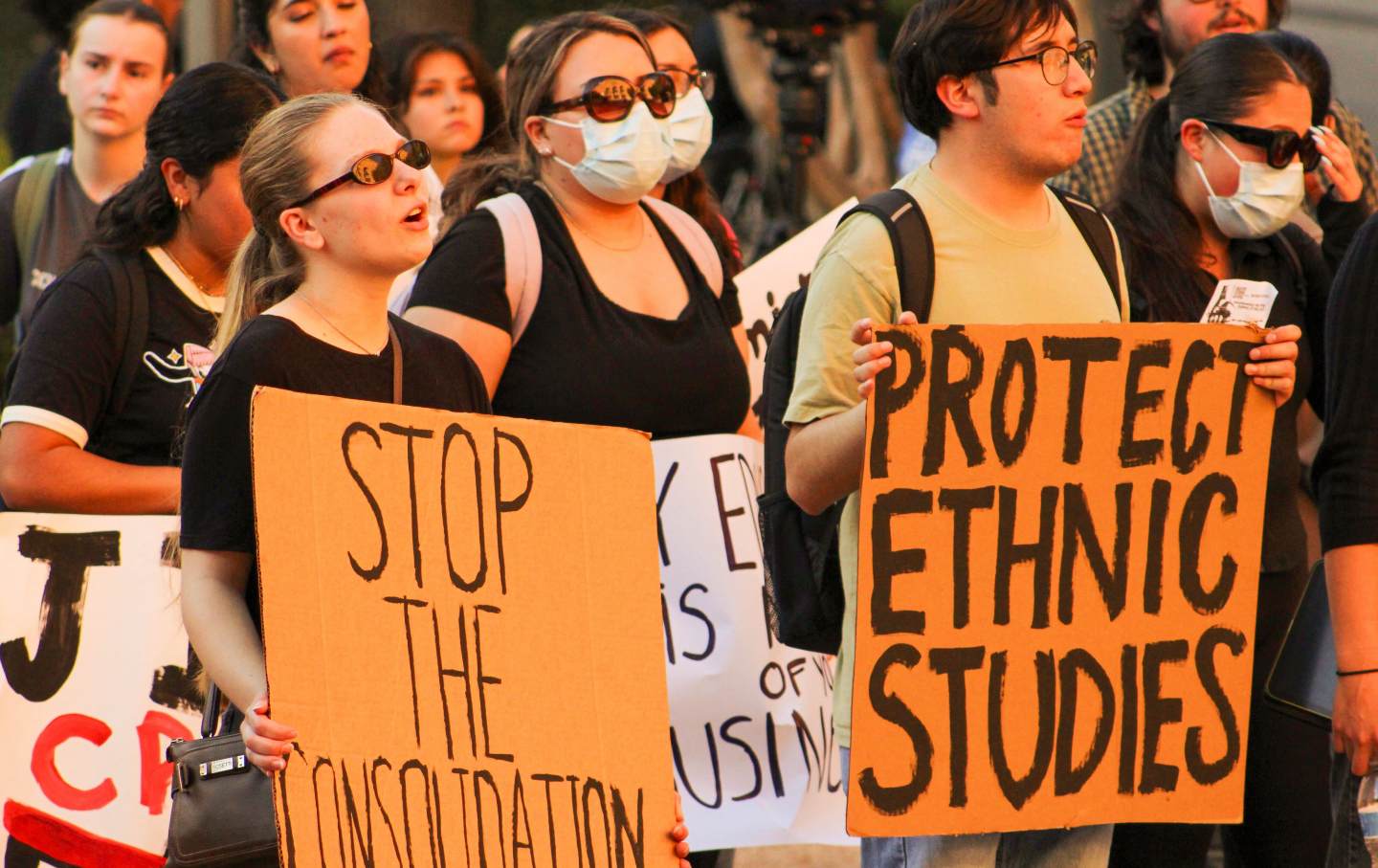Trump’s Transgender Military Ban Doesn’t Make Sense. It Didn’t the First Time Either.
The ban will only serve to create chaos and risk the health and safety of Americans.

The US Armed Forces recruiting station in Times Square.
(Roberto Machado Noa / LightRocket via Getty Images)
In a barrage of extreme executive orders, uprooting long standing constitutional norms and legal policies, from birthright citizenship to antidiscrimination in government employment, President Donald Trump has outlined the wasteful and economically inefficient focus of his new administration. Despite boastful claims of stewarding an economically vibrant agenda seemingly by dismantling nondiscrimination policies, what awaits Americans are hard lessons about how the economy and rule of law really work.
Take removing transgender service members from the armed forces. Transgender service members have been permitted since 2016, save for the period of Trump’s last executive order removing them from service. But Trump made clear on the campaign trail that his administration would be hostile to recently secured transgender rights—and he did not hold back upon taking the oath of office.
In August 2024, he unveiled his plans at a rally in North Carolina, informing the crowd, “If you want to have a sex change or a social justice seminar, then you can do it somewhere else, but you’re not going to do it in the Army, Navy, Coast Guard, Air Force, Space Force, or the United States Marines—sorry.”
Taking aim this week, in the “Prioritizing Military Excellence and Readiness” executive order, he claimed that “the Armed Forces have been afflicted with radical gender ideology to appease activists unconcerned with the requirements of military service like physical and mental health, selflessness, and unit cohesion” and that “expressing a false ‘gender identity’ divergent from an individual’s sex cannot satisfy the rigorous standards necessary for military service.” In sum, according to Trump, “A man’s assertion that he is a woman, and his requirement that others honor this falsehood, is not consistent with the humility and selflessness required of a service member.“
While Trump’s rhetoric may translate as a score or deliverable to his base, does it make sense? Ultimately, Trump’s anti-trans policy agenda may blind his administration to the realities and costs of doing so.
In a CNN interview this week, Navy Commander Emily Shilling shed light on this. Shilling has served for nearly two decades with two tours in Iraq and Afghanistan, flying 60 combat missions and becoming a test pilot. Time and again, Shilling received commendations for being meritorious. In other words, the new policy ignores exactly what Trump claims to be in search of: merit and talent.
Further, by reorganizing the military by edict, the 47th president is exposing ignorance, fear, and weakness, not strength and fiscal savviness. Removing experienced, proven, and committed members of the armed forces from their jobs based on sex not only reinforces stereotypes; it also invites chaos and creates serious gaps that “will take decades to fill,” according to Commander Shilling. This includes soldiers who take to the front lines, commanding officers, lawyers, special forces rangers, and others. Those glaring holes in leadership and experience will predictably undermine readiness, morale, and safety.
None of this is new, but the impacts may be more severe. Much like during his first term, the policy was announced along with a slew of executive orders targeting LGBTQ communities and stripping away protections. One such order claims that there are only two sexes—completely ignoring science and medicine, as some individuals are born with male and female reproductive organs.
Trump’s first transgender military ban in 2017 was launched through a series of tweets on the platform now known as X. To justify the ban, which effectively reversed the 2016 Obama administration order permitting transgender individuals to serve in the military, he claimed that such a policy harmed the armed forces. Trump alleged that trans members of the armed services caused economic hardships and burdened the military. Advocacy groups immediately challenged the ban, as they did just this week, in Talbot v. Trump, arguing, “The Due Process Clause of the Fifth Amendment prohibits the federal government from denying equal protection of the laws.” And they are right, the ban does discriminate against these members of the military based on their sex and without lawful justification.
Still, let’s consider the Trump administration’s erroneous and debunked claims. First, the president has claimed that allowing transgender individuals to serve in the military would bring about considerable financial burdens. However, his financial analysis was just plain wrong. According to a study published by the RAND Corporation, allowing trans-inclusive medical care marginally increased healthcare “spending by only 0.038-0.054 percent.” By contrast, the sexual health costs associated with cisgender members in the military who seek and receive services to address erectile dysfunction is incredibly high.
At the time of his first transgender ban, studies showed that the military spent over $82 million a year to address erectile dysfunction in its male service-members. In 2015, Patricia Kime, a senior writer for Military Times, noted that the Department of Defense (DoD) spent $84.24 million on erectile dysfunction medications in 2014, including $41.6 million for Viagra, $22.82 million for Cialis, and $2.24 million for Revatio. These expenses predated transgender individuals’ being able to openly enlist and only shortly after the repeal of the Clinton-era policy “Don’t Ask, Don’t Tell.” In a three-year period from 2011 to 2014, the DoD spent a total of $294 million on erectile dysfunction medications.
The point is not to demean service members who need medical support to aid and benefit their health and well-being. As the Mayo Clinic notes, “having erection trouble” may “cause stress, affect…self-confidence and contribute to relationship problems.” The problem here is governing by shortcuts and stereotypes. And the administration itself is inviting scrutiny of all military spending.
Popular
“swipe left below to view more authors”Swipe →Second, Trump has claimed that military readiness and cohesion will suffer if the military permits transgender service members. In a law review article I published with UC Berkeley School of Law dean Erwin Chemerinsky, we debunked that claim, explaining that “unit performance is associated with task cohesion—not necessarily social cohesion, which relates to individuals’ friendships and family relationships.” We noted that internal military reports found the “armed forces…had valuable and highly skilled transgender members.” Courts, too, have recognized the weaponization of “unit cohesion” as a foil for homophobia and sex-based discrimination. Specifically, in Log Cabin Republicans v. US, the US Court of Appeals for the Ninth Circuit concluded that the “loss of unit cohesion” has been weaponized “against open service by a new minority group.” And the Armed Forces have come to a similar conclusion.
In 2015, Secretary of Defense Ashton Carter convened a working group comprised of senior military leaders, medical experts, service members, and researchers from the RAND Corporation. After comprehensive study, they issued a memorandum and DoD fact sheet clarifying that “open service by transgender Service members, while being subject to the same standards and procedures as other members with regard to their medical fitness for duty, physical fitness, uniform and grooming, deployability, and retention, is consistent with military readiness.”
Predictably, Trump’s transgender military ban will only serve to create chaos and risk the health and safety of Americans by irresponsibly curating a culture of surveillance and fear within the armed services.
More from The Nation

The Real Reason Americans Love Guns The Real Reason Americans Love Guns
With a weak social safety net, a gun offers a false sense of personal power and security.

The Endless Hypocrisy of Bari Weiss The Endless Hypocrisy of Bari Weiss
She claims to be a free speech champion. But as her actions at CBS News keep showing, she seems to think free speech should run only in a rightward direction.

What Will Be Left After the University of Texas Destroys Itself? What Will Be Left After the University of Texas Destroys Itself?
UT-Austin has collapsed its race, ethnic, and gender studies into a single program while a new policy asks faculty to avoid “controversial” topics. But the attacks won’t end there...

The Corporate Media Is Head Over Heels for the Iran War The Corporate Media Is Head Over Heels for the Iran War
Donald Trump’s attack may be surreal, unjustified, and illegal. But that’s not stopping the press from turning the propaganda dial way up.

The Disturbing History of ICE’s “Death Cards” The Disturbing History of ICE’s “Death Cards”
The Vietnam-era practice is yet another example of ICE agents thrilling to the brutality they have been encouraged to cultivate.

The American Universities Programming Israel’s Killer Drones The American Universities Programming Israel’s Killer Drones
Industry partnerships in higher education are pushing STEM graduates into the business of weapons manufacturing and genocide profiteering.


